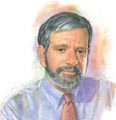
Alan Ehrenhalt
http://www.jewishworldreview.com --
I'VE been a soccer dad for the better part of a decade now -- this spring
marked my 13th season -- and in all of those hours watching from the sideline,
I've learned a few things.
Unfortunately, I haven't learned much about soccer.
I still have to ask the rules on an indirect kick, and I can't tell a legal push from an illegal one. But one small morsel of knowledge seems clearer to me with every passing year: Soccer fans have a tendency to take ordinary physical realities and convert them into tests of will and character.
When our players are beaten to the ball consistently for an entire game, we often assume it's because they aren't focused, or they're being intimidated, or they're mad at the coach, or they just don't want to win badly enough. "The girls looked so sharp this morning -- what happened to them this afternoon? They must have lost their edge during the lunch break."
Every once in a while, there's a game in which this actually happens. Much more often, however, there's a simpler problem: The other team is bigger, or stronger, or faster, or some combination of all three. What the parents are doing is psychologizing.
The more I think about this, the more I'm convinced that it isn't just something soccer parents do; it's a trait common to fans, athletes, competitors of all sorts, human beings in general. Given the slightest opportunity, we find ways to portray winning and losing as the outcome of a morality play, rather than accepting the more banal truth that, in much of life, the race really is to the strong and the swift.
Just this past weekend, analysts speculated that Tiger Woods, despite his poor showing in the U.S. Open, cast a psychological shadow that caused the actual leaders to play poorly in the chaotic fourth round.
Howard Cosell used to accuse his fellow announcers of psychologizing on Monday Night Football. I hesitate to bring him up, because, like millions of fans all over the country, I couldn't stand listening to him. But like many people who didn't know much about football, he understood a few simple things about life.
After his colleagues in the booth finished expounding on the intricacies of the flex defense or the deceptiveness of the offensive formation, Cosell would come on and say that "the guys in blue are hitting harder and shoving the other line all over the field, and the rest of it doesn't make much difference." Most of the time, I think it was true.
It's true of enterprises much more important than soccer or football. War, for example. Millions of words have been written about the subtleties of military strategy, but there's an equally important tradition of generals coming forward to tell the public that it really isn't that complicated. How did Nathan Bedford Forrest win all of those Civil War battles? It wasn't by being smarter, he said. He just got there first with the most men.
Nobody who has written about the Civil War has disputed that Robert E. Lee was a subtler, more creative, more agile strategist than Ulysses Grant. What Grant had was more bodies and more resources that he could afford to lose.
The bottom-line explanation of World War II, as it has emerged in the scholarship of recent decades, is roughly similar. Satisfying as it might be to think that America outmaneuvered Hitler, the truth is we mostly outmanufactured him. The war was won in the automobile factories of Detroit that we managed to convert into bomber plants.
The tendency to psychologize comes up in the trenches of everyday life as well. Every time I check out at the supermarket, I notice at least one front-page story in the tabloids about a celebrity waging a "gallant battle" against some form of wasting illness. This may seem like nothing more than a harmless cliché, but it does have serious implications, as author Susan Sontag pointed out two decades ago. It suggests that those who succumb perhaps just didn't fight bravely enough. Deep down, we all know the whole idea is nonsense. But it creates a story line that neither headline-writers nor tabloid readers -- nor any of us -- are quite willing to give up.
Why is that? Why do we go out of our way to explain so many different kinds of physical events in psychological terms?
Well, one reason is that it's more fun. Or at least it keeps conversations going. Benighted as I am on the subject of soccer, I can hold up my end of a prolonged debate on the motivational status of the midfielders. If we concede that it's more likely a matter of speed and strength, there isn't as much to talk about.
But there's another reason as well. At its root, psychologizing is a form of spiritual activity. It suggests that, no matter how bleak the physical matchup might be, there is always hope. We may not be able to outrun or outhit them, but so what -- strategy and strength of character may still pull things out in the end. If you don't think so, ask Goliath.
So we beat on, boats against the current, etc., etc., etc. And you know what --- every once in a while it wins a soccer game.
Wars, I'm not so sure
JWR contributor Alan Ehrenhalt is executive editor of Governing magazine and the author of "Democracy in the Mirror: Politics, Reform, and
Reality in Grassroots America" and "The Lost City: The Forgotten Virtues of
Community in America." Comment by clicking here.

